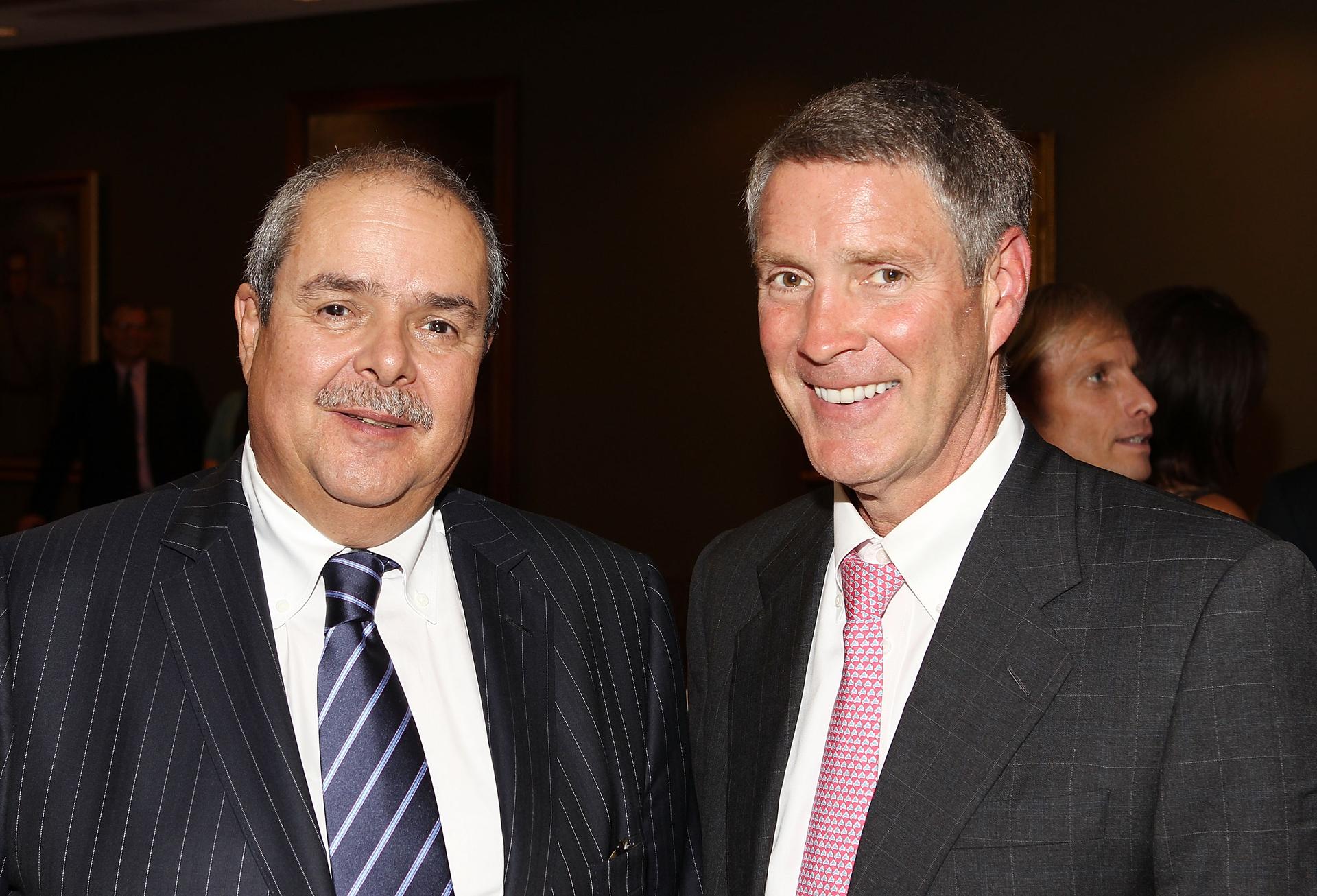Conversations from AIDS 2012: Sen. Bill Frist on HIV work as ‘currency for peace’
Gabriel Jaramillo (L), general manager of Global Fund, and Senator Bill Frist, M.D., founder of Help Through Healing Hands, pose for a photo on July 23, 2012 in Washington, DC.
WASHINGTON, DC — Former Senate Majority Leader Bill Frist, a Tennessee Republican and a practicing physician, doesn’t return to Washington much. But he came for three days of the International AIDS Conference to talk about the importance of winning bipartisan support for the President’s Emergency Plan for AIDS Relief (PEPFAR).
Frist, along with Senator John Kerry and Jesse Helms, along with many others, played key roles in building and sustaining a large bipartisan Congressional coalition to fight AIDS globally starting in the late 1990s. But that coalition has become badly frayed in recent years, and Frist is one of several trying to rebuild it.
He helped recruit a panel on Wednesday at the International AIDS Conference, ‘The US Congress and the Global AIDS Epidemic,’ which also featured Rep. Barbara Lee, a Democrat; and Senators Chris Coon, a Delaware Democrat; Marco Rubio, a Florida Republican; and Mike Enzi, a Wyoming Republican. Frist talked with John Donnelly about the importance of bipartisanship, and whether he thought it would continue for PEPFAR and other global health programs.
Q: What’s your assessment for future support in Congress for PEPFAR?
A: The times are challenging. The backdrop for the next five years will be focused on fiscal restraint. At a time where most Americans falsely believe that we are spending 10 percent on foreign aid and development — even when we’re spending 1 percent of the budget on foreign aid — the challenge becomes even more acute.
That can be rectified by more communication, better education and establishing the facts, reaching out directly to Americans such that they understand and don’t put pressure on their legislators to indiscriminately cut.
Since the late 1990s, there’s been clear bipartisanship for this issue. What happens in this climate of increasing polarity, well, I’m concerned about it. But if we start with the core of people on the panel [Wednesday], and expose them to what we didn’t have five years ago, namely the results, the outcomes, that could be strong enough to overcome the pre-existing currents of gridlock and severe partisanship. I know it can be done.
Q: Did the introduction of the Global Health Initiative (GHI) by the Obama administration contribute to the loss of bipartisanship in Congress?
A: GHI was a challenge, but it was a necessary challenge. There was a loss of clarity in terms of purpose. It’s easier to talk about a single disease, whether it is HIV, or malaria, or tuberculosis. We had an eight-year history of using the same language. The new language was confusing. The substance was correct, to build on the infrastructure created by PEPFAR. But there was a period of about two years where there was a lack of clarity of purpose.
Q: Many people say that bringing members of Congress to Africa to see first-hand the results of US-funded health programs is the best way to win champions. Has that been your experience?
A: Absolutely. Mike Enzi will say, ‘I didn’t know anything about global health, but that trip to Africa in August 2003 opened my eyes.’ My first act as Majority Leader was to take a bipartisan group of nine leaders, US senators, to Africa. It is the single most powerful way to have Americans — whether it’s young physicians, young nurses, young physical therapists, Congressmen or women — to see first-hand the results as well as the challenges.
Q: Why is this still a big part of your life?
A: People have really wondered about that, about why I would spend a month doing surgery in Africa while I was Majority Leader. For me, this work has played out in Haiti; in Sri Lanka after the tsunami; in New Orleans after Katrina. What attracts me is the service and it’s also working at the policy level and linking those two. That sort of connecting the dots is part of my DNA. Our work in global health and economic development is clearly the right thing to do in terms of jobs created and seeing the improved health.
You could see this in work through the Clinton Bush Haiti Fund, where we got 300 artists together in Haiti and three months later they were selling their work to Macy’s buyers. We get 300 people working. I got to see that. It was all started on the ground three days after Haiti.
There’s something more as well: that health and medicine and HIV work is a currency for peace around the world. It leads to trust and it leads to understanding.
The story you just read is accessible and free to all because thousands of listeners and readers contribute to our nonprofit newsroom. We go deep to bring you the human-centered international reporting that you know you can trust. To do this work and to do it well, we rely on the support of our listeners. If you appreciated our coverage this year, if there was a story that made you pause or a song that moved you, would you consider making a gift to sustain our work through 2024 and beyond?
